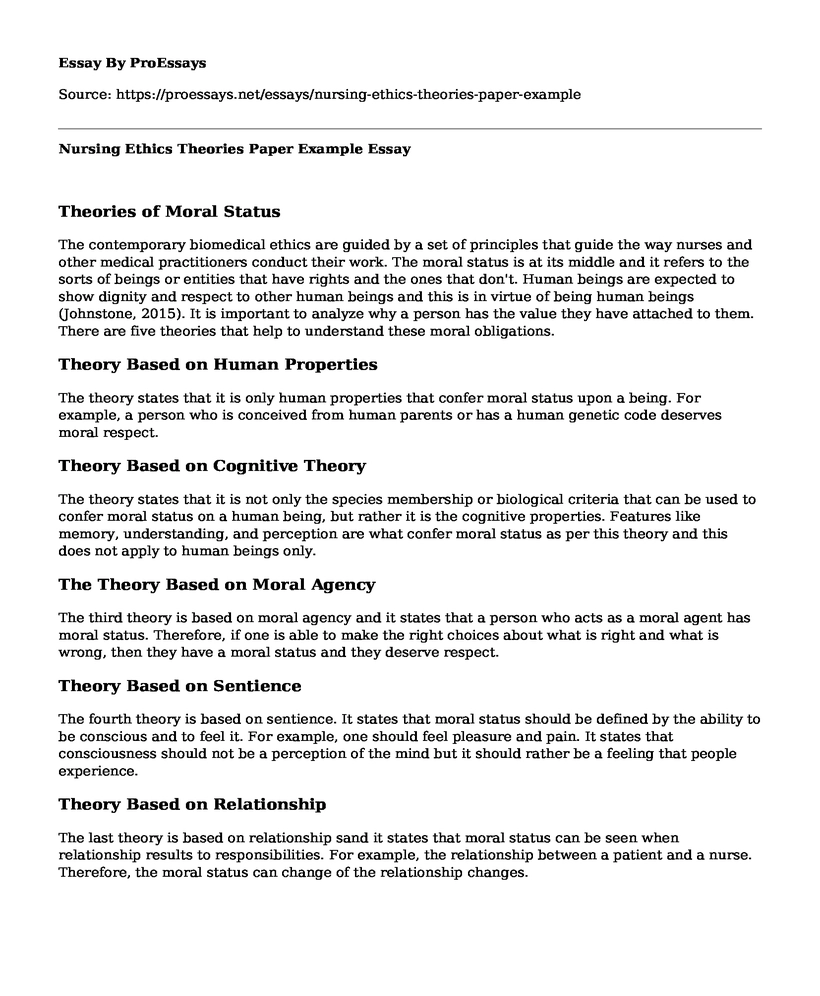Theories of Moral Status
The contemporary biomedical ethics are guided by a set of principles that guide the way nurses and other medical practitioners conduct their work. The moral status is at its middle and it refers to the sorts of beings or entities that have rights and the ones that don't. Human beings are expected to show dignity and respect to other human beings and this is in virtue of being human beings (Johnstone, 2015). It is important to analyze why a person has the value they have attached to them. There are five theories that help to understand these moral obligations.
Theory Based on Human Properties
The theory states that it is only human properties that confer moral status upon a being. For example, a person who is conceived from human parents or has a human genetic code deserves moral respect.
Theory Based on Cognitive Theory
The theory states that it is not only the species membership or biological criteria that can be used to confer moral status on a human being, but rather it is the cognitive properties. Features like memory, understanding, and perception are what confer moral status as per this theory and this does not apply to human beings only.
The Theory Based on Moral Agency
The third theory is based on moral agency and it states that a person who acts as a moral agent has moral status. Therefore, if one is able to make the right choices about what is right and what is wrong, then they have a moral status and they deserve respect.
Theory Based on Sentience
The fourth theory is based on sentience. It states that moral status should be defined by the ability to be conscious and to feel it. For example, one should feel pleasure and pain. It states that consciousness should not be a perception of the mind but it should rather be a feeling that people experience.
Theory Based on Relationship
The last theory is based on relationship sand it states that moral status can be seen when relationship results to responsibilities. For example, the relationship between a patient and a nurse. Therefore, the moral status can change of the relationship changes.
Conclusion
The nursing profession has experienced changes from the legal and moral dimensions of defining personhood and such theories have given new definitions (Sofronas, Wright & Carnevale, 2018). The analysis of the theories above shows that the nursing profession is dynamic and the ethical concerns have roots in both spiritual beliefs and ethical principles. In conclusion, nursing as a profession has a role in maintaining the ethical, moral and dignity standards in society, based on spiritual and ethical standards.
References
Johnstone, M. J. (2015). Bioethics: a nursing perspective. Elsevier Health Sciences.
Sofronas, M., Wright, D. K., & Carnevale, F. A. (2018, October). Personhood: An evolutionary concept analysis for nursing ethics, theory, practice, and research. In Nursing forum.
Cite this page
Nursing Ethics Theories Paper Example. (2022, Nov 06). Retrieved from https://proessays.net/essays/nursing-ethics-theories-paper-example
If you are the original author of this essay and no longer wish to have it published on the ProEssays website, please click below to request its removal:
- Issues in Social Work
- MBC Reflection and Conclusion: The Experience of Living With Metastatic Breast Cancer
- Essay Sample on the Benefits of Community Public Health Officers
- Simulation-Based Nursing Education: Exploring Benefits & Challenges - Essay Sample
- Essay Example on Holistic Care for Dementia Patients: Nursing Staff Competencies
- Food & Nutrition: A Necessity for Life, Differentiated by Humanity - Essay Sample
- Essay Example on Global Healthcare Stressors: Strategies for Administration and Nursing Shortage







